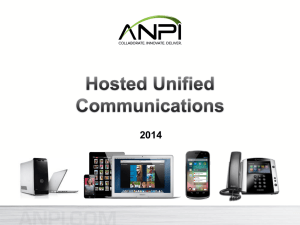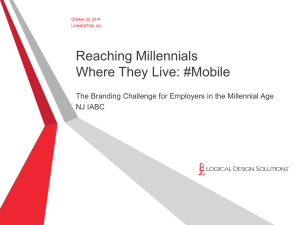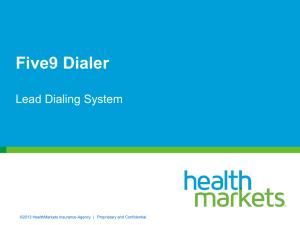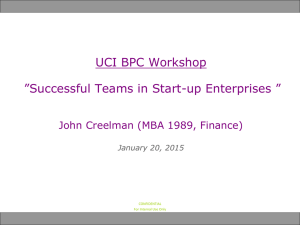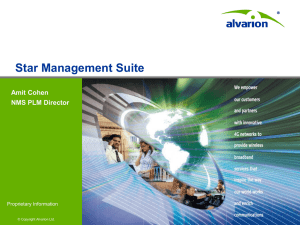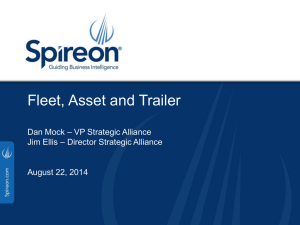Hosted UC Perspective 1.0 (ANPI)
advertisement
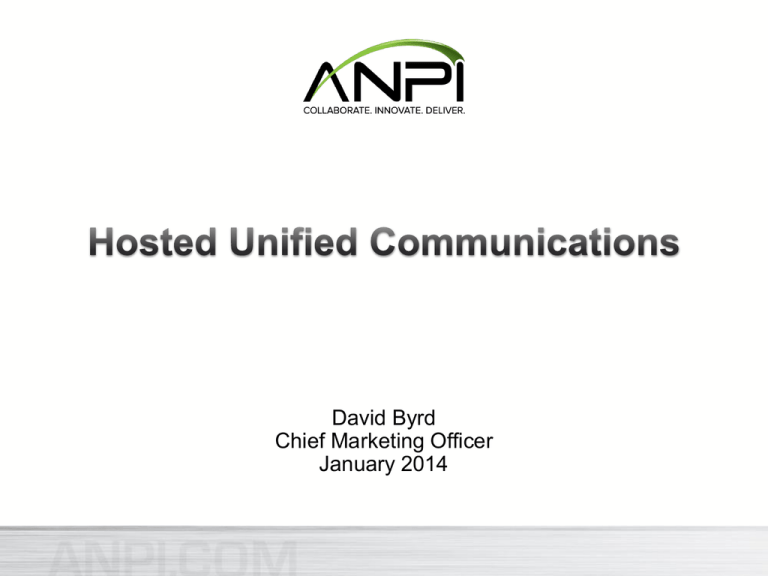
David Byrd Chief Marketing Officer January 2014 Our Mission Become the nation’s leading provider of cloud-based unified communications and application solutions to small and medium sized businesses as well as small to mid-size communications providers Our Solutions Hosted Unified Communications: • Private Label Package • End-user solution • Innovative widget based portals • Automated end-to-end provisioning Cloud based applications (eFax, Call Recording, Storage) Carrier Solutions include Long Distance, Tandem Services and SS7 Connectivity Our Resources ~$123 million revenue Serve roughly 800 carriers and independent RLECs ≈ 135 employees Operations in Springfield, Illinois, Frisco, Texas and Santa Clara, California Nationwide Network with major switching centers in New York, Atlanta, Chicago, Dallas, Las Vegas, and Los Angeles Confidential and Proprietary. Subject to Non-Disclosure Agreement. 2 Established 1996, 18+ years experience as service provider to telephone companies, wireless service providers and carriers nationwide Transport billions of minutes on a private nationwide IP network U.S. Market for IP-Based Business Access Lines $70,000,000 50% $60,000,000 40% $50,000,000 $40,000,000 30% $30,000,000 20% $20,000,000 10% $10,000,000 $0 0% Dec-09 Jun-10 IP Business Lines Dec-10 Jun-11 Total U.S. Business Lines IP Telephony Penetration 12/31/2009 6/30/2010 12/31/2010 6/30/2011 12/31/2011 Total U.S. Business Lines 62,064,000 61,417,000 61,485,000 61,520,000 60,525,000 IP Business Lines 3,574,000 3,665,000 4,614,000 5,019,000 5,753,000 IP Telephony Penetration 5.80% 6.00% 7.50% 8.20% 9.51% *Source: FCC Form 477 Filing Data, Local Telephone Competition: Status as of December 31, 2011, dated January 2013 Confidential and Proprietary. Subject to Non-Disclosure Agreement. 3 Dec- 11 • Infonetics reported that 43 percent of survey respondents said they are using SIP trunks, adding that adoption of SIP trunking services will drive enterprise SBC market growth five-fold from 2010 to 2015. • 58% of businesses will use at least some SIP trunks in 2015 while 55% say they will use will use at least some T-1s. Today 38% using some SIP Trunking and 71% using some T-1s. • Infonetics “, global deployment of SIP Trunking grew by 23 percent in the first half of the year.” • Eastern Management Group “13 percent of businesses use SIP for all of their WAN traffic and forecasts that by 2018, 42 percent of companies will do so.” Confidential and Proprietary. Subject to Non-Disclosure Agreement. 4 • Multiple communication modalities • Different interfaces and technologies • Lack of integration • Often heavy end-user CapEx, inevitable technological obsolescence Confidential and Proprietary. Subject to Non-Disclosure Agreement. COMMON MANAGEMENT User Experience Portals Voicemail Vertically aligned communication silos • Inefficient communications • Communications overload • Parallel infrastructures Confidential and Proprietary. Subject to Non-Disclosure Agreement. Colloboration Web Conference Enterprise Telephony Video Conference Choice beyond Voice IM and Presence Audio Conference Overall Costs Down eMail & Integration eMail and Instant Messaging SEPARATE MANAGEMENT Enterprise Telephony Horizontally integrated common platform • Standards-based distributed architecture • Accessibility in the entire network • One common database Confidential and Proprietary. Subject to Non-Disclosure Agreement. Increase Productivity Confidential and Proprietary. Subject to Non-Disclosure Agreement. 8 Enable Mobility Increase Collaboration Eliminate/Reduce Capital Expenditures Avoid Technology Obsolescence Achieve Business Continuity • Communication bottle necks occur when: • One cannot locate key party to solve issue • One cannot coordinate meeting to resolve problem • Information is difficult to find and access • One receives no response to important email messages Confidential and Proprietary. Subject to Non-Disclosure Agreement. 9 With Integrated Messaging • Reach the right people quickly • Contact using a single number • Establish ad hoc audio, web and video conferences • Leverage mobile devices Confidential and Proprietary. Subject to Non-Disclosure Agreement. 10 • The lack of UC capabilities for remote workers results in a substantial “productivity gap” between mobile/offsite and onsite workers which results in a productivity loss of 2.5 hours per week per employee • Approximately 18% of projects are delayed because of ineffective team collaboration and an estimated 16% of projects are delayed because a decision maker could not be reached • Enterprise workers listed “Sharing Files” and “Participating in a Multimedia Conference” as the two most “painful” tasks to perform when working offsite Confidential and Proprietary. Subject to Non-Disclosure Agreement. 11 • 43% of business owners use a cell phone as their primary communications platform • Smartphones now make up 61% of cell phone users • Only 20% of Smartphone usage is for making phone calls • Smartphones are used as the primary device for online access by 50% of users Confidential and Proprietary. Subject to Non-Disclosure Agreement. 12 Integrated Mobility • Mobile Client • Chat • Presence • Desktop Sharing • Call Handling • Audio/Web/Video Collaboration • Outlook Integration Chadwick Martin Bailey • 54% of organizations saved up to 20 minutes per employee daily by escalating IM chats into phone calls. • 50% of organizations saved up to 20 minutes per employee daily by escalating IM chats into Web conferences • 46% of organizations realized travel savings of more than five days per employee annually. • 68% of organizations reported productivity improvements between geographically-dispersed functional groups. • Over 75% percent of organizations experienced improved productivity of employees across geographically-dispersed locations due to voice and video conferencing. • 64% of organizations experienced reduced travel costs of over 10%. Confidential and Proprietary. Subject to Non-Disclosure Agreement. 13 Confidential and Proprietary. Subject to Non-Disclosure Agreement. 14 Collaboration • Audio Conferencing • Web Meeting • Video Conferencing • Desktop Sharing Confidential and Proprietary. Subject to Non-Disclosure Agreement. 15 • Mobile Client • Chat • Presence • Call Handling • Outlook Integration • 50% of SMBs admit to not having Business Continuity or Disaster Recovery plans in place • 16% believe there is no business requirement to have such a plan • Only 28% have an actual plan in place Confidential and Proprietary. Subject to Non-Disclosure Agreement. 16 • “A Company that experiences a computer outage lasting more than 10 days will never fully recover financially. 50% will be out of business within five years.” — Jon Toiga, Disaster Recovery Planning: Managing Risk and Catastrophe in Information Systems • 70% of small firms that experience a major data loss go out of business within a year. —Strategic Research Corp and DTI/PWC • 43% of Businesses that experience a disaster and have no emergency plan never reopen; of those that do reopen, only 29 percent are still operating two years later. —The Hartford Financial Services Group Confidential and Proprietary. Subject to Non-Disclosure Agreement. 17 ABI Research forecasts that the global market for business continuity and disaster data recovery solutions will grow from $24.3 billion in 2009 to exceed $39 billion in 2015 Hosted Unified Communications supports Business Continuity by: • Redundant servers • Geographically dispersed servers • Alternate routing of calls (call forwarding, simultaneous ring, find me/follow me, etc. • Alternate call devices (IP Phone, Smartphone, Laptop, Tablet) Confidential and Proprietary. Subject to Non-Disclosure Agreement. 19 • $25,000 on-premises collaboration and audio conferencing solution may be difficult to get approved, however, a hosted solution for less than $400 per month can initiate a powerful internal conversation. • By moving to hosted , Companies were able to reduce their 3-year TCO by 54%. – IDC • IT maintenance is around 80% of total IT expenditure, thus the shift to hosted. – Gartner • Hosted can make the difference between an organization being 20% efficient and being 80% efficient. – Diversity Limited Confidential and Proprietary. Subject to Non-Disclosure Agreement. 20 • Need new infrastructure • Cloud services are quick to deploy • Rent versus purchase the solution • Acquire Future Proof technology vs non-returnable licenses and ongoing maintenance fees • Scale IT up and down easily adjust business in accordance to economic environment • Don’t believe that you have to spend money to make money Confidential and Proprietary. Subject to Non-Disclosure Agreement. 21 • No Equipment Cost • Phones can be purchased (CAPEX) or leased (OPEX) • No annual maintenance fees • Fixed monthly usage fees • Scale your service as your business grows or shrinks • Add or delete services on a per user basis Confidential and Proprietary. Subject to Non-Disclosure Agreement. 22 • The average lifespan for a handset in the US is 21.7 months. – Recon Analytics • Average server life span is 3 years – Computer World • Average laptop life span is 2.5 years. • New IP PBXs are forecasted to last only 6.5 years, while traditional PBXs could be counted on for 8.5 or more years. • One study respondent indicated that they had to replace their PBX after only three years “ because the upgrade cost was almost equal to the original capital expenditure. Confidential and Proprietary. Subject to Non-Disclosure Agreement. 23 Hosted communications allows businesses to leverage: • Other application buyers to reduce acquisition cost • Advances to the hosted application are spread across all users • Upgraded Servers to maintain SLA committed performance without changes to monthly charges • New features are made available to subscribers on a regular basis Confidential and Proprietary. Subject to Non-Disclosure Agreement. Increase Productivity Enable Mobility Increase Collaboration Eliminate/Reduce Capital Expenditures Avoid Technology Obsolescence Achieve Business Continuity Now You know the Rest of the Story! Confidential and Proprietary. Subject to Non-Disclosure Agreement. 25 David Byrd dbyrd@anpi.com 214.377.0944 26
